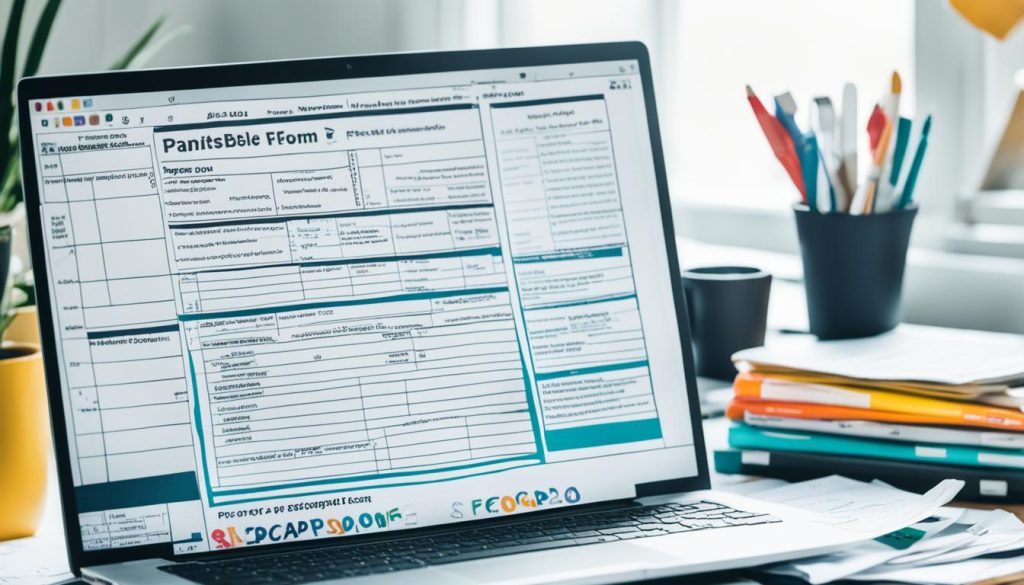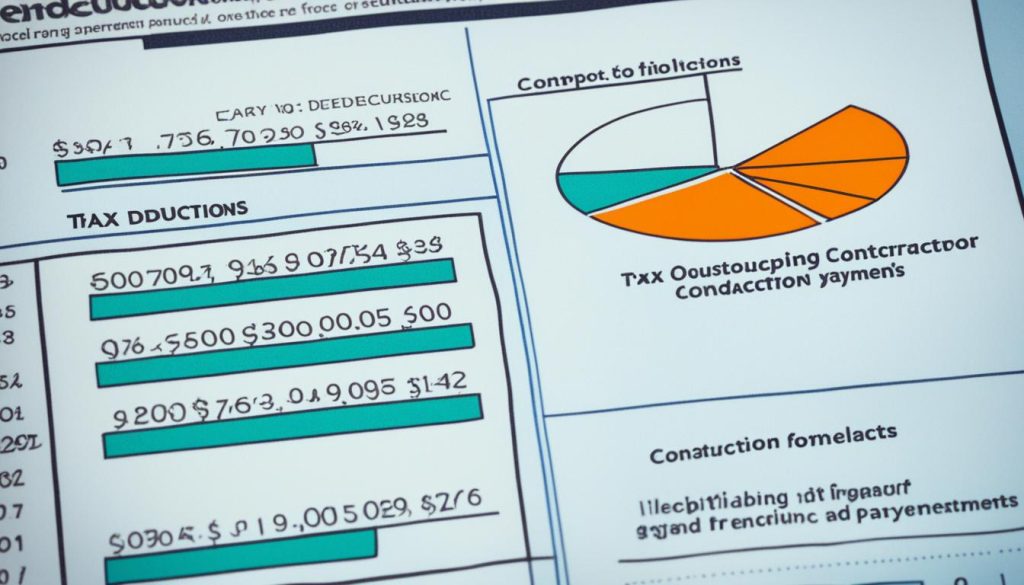Did you know that blogging can help you save on taxes? Your love for blogging can bring financial benefits at tax time. You can gain from a variety of deductions. We will explore these and how to make the most of them.
Getting informed about tax deductions is key for bloggers. You can often deduct costs like office supplies and marketing. Knowing the IRS rules is essential in this area.
The IRS site offers extensive information on what you can deduct as a blogger. It’s a great starting point to boost your tax savings. Don’t miss out on these advantages in the blogging world.
The Importance of Financial Planning for Bloggers
Understanding financial planning is crucial for bloggers. They don’t always have the same financial safety nets as those in traditional jobs. This is where personal finance skills come in handy.
A solid financial plan can help ensure a blogger’s future success and stability. It involves understanding tax benefits from blogging. With this knowledge, bloggers can make better financial decisions.
Financial planning includes budgeting, saving, and investing. Bloggers align their financial goals with their earnings. This creates a plan for both short and long-term objectives.
One important part of financial planning is using blogging’s tax benefits. Bloggers can lower their taxable income by using deductions. This helps increase savings and secure their financial future.
Bloggers should know that taxes for them are different from traditional jobs. While it’s a challenge, it also brings chances to save more on taxes.
Financial planning also covers dealing with risks in blogging. Factors like changing audience interests affect a blogger’s income. Planning helps bloggers stay stable and adjust to changes.
Consider Emma, a blogger who understands the value of finance. She has a growing blog but knows it might not always be stable. So, she plans how to manage her income wisely.
Emma learns about tax benefits for bloggers. She creates a budget that includes savings from taxes. This helps her fulfill financial goals.
Emma’s plan includes setting money aside for emergencies and retirement. She also saves for future blog needs or personal goals. And she revisits her plan to match changes.
By managing her finances well, Emma secures her financial future. She uses her blog income wisely, ensuring long-term benefits.
Key Components of Financial Planning for Bloggers
| Components | Importance |
|---|---|
| Budgeting | Allows bloggers to track income and expenses, ensuring financial stability and informed decision-making. |
| Tax Planning | Understanding applicable tax laws, deductions, and write-offs to optimize savings and reduce taxable income. |
| Savings and Investments | Building emergency funds, saving for retirement, and investing in long-term financial goals. |
| Debt Management | Strategically managing debts, such as student loans or business loans, to minimize interest payments and maintain a healthy financial status. |
| Risk Management | Identifying potential risks, such as fluctuating income or changing market trends, and taking appropriate measures to mitigate them. |
Financial planning is key for a blogger’s financial success. Using smart finance strategies and understanding tax benefits helps in the digital world.
Low Start-up Costs and High Earning Potential of Blogging
Starting a blog is easy and doesn’t require much money. Traditional businesses need a lot of cash to start, but not blogging. This makes it possible for more people to try their hand at being their own boss. Blogging is a great way to make money online without a big financial risk.
All you need to start a blog is a web name, hosting, and WordPress. These usually cost between $100 and $300 each year. This is way cheaper than opening a store or office. Blogging lets you begin your business journey online for much less.
There are lots of ways to make money from your blog once it’s running. You can show ads, do sponsored posts with companies, or sell other people’s products for a commission. You could even create and sell your own digital stuff, like books or classes.
But, blogging doesn’t make you rich overnight. It takes time and hard work to see big money. The good news is, many bloggers make a lot of money every year. They’ve turned their blogs into serious businesses, making thousands or even millions of dollars.
Here are some examples of successful bloggers and their high earning potential:
| Blogger | Annual Earnings |
|---|---|
| Pat Flynn (Smart Passive Income) | $2,000,000+ |
| Arianna Huffington (HuffPost) | $29,000,000+ |
| Michelle Schroeder-Gardner (Making Sense of Cents) | $1,500,000+ |
These bloggers are famous for making a lot of money through blogging. While not everyone gets that rich, making good money from blogging is very real. Starting a blog can lead to financial freedom and the chance to reach people worldwide, if you work hard and smart.
Living Paycheck to Paycheck? Blogging Can Provide Financial Relief
Many are tackling month-to-month finances, trying hard to survive. This financial pressure affects our minds and bodies. Yet, there’s a way out. Blog for extra income can help you leave the paycheck loop behind.
Starting a blog can boost your earnings. It can bring financial relief and new chances to grow financially. Many have found blogging to be a great path to financial stability.
When you blog, sharing what you know and love online, you connect with readers. This can lead to earning from sponsored posts, affiliate sales, and selling digital products. These can all break the paycheck cycle.
Blogging can also have long-lasting financial perks. A growing blog means more money. So, you might need your job less, and blogger life could be your new path.
As a blogger, you get some tax benefits. You can deduct blog-related costs, like hosting and ads, from your taxes. This means more money in hand for you.
If budget struggles bother you, try blogging. It’s a chance for extra income and a stabler financial future. Blogging isn’t just about today; it could be your tomorrow’s main source of income.
Start your blog today and see how it changes your financial story. It might be the break you need from the paycheck-to-paycheck cycle. Here’s to finding the financial relief you deserve.
Being Self-Employed as a Blogger
Being a self-employed blogger means I handle my taxes. Unlike workers who get tax taken from pay, I manage it all. This brings different tax rules that every self-employed blogger needs to know.
I must estimate and pay taxes often. Without tax taken from my earnings, it’s up to me. This happens four times a year. By doing this, I keep up with tax duties and steer clear of fees. The IRS has clear rules for this, making it easy to do.
As a self-employed person, I also deal with self-employment tax. This tax combines what both employers and employees pay for Social Security and Medicare. It’s figured from the profit of my blogging business. The rate is more than what regular employees pay because I cover both parts.
To handle these taxes right, I need to be organized. Tracking my earnings and what I spend helps. It lets me report my income correctly and lower my tax bill by claiming deductions.
For more about taxes for self-employed bloggers, Peter J. Reilly wrote a great piece on Forbes. It talks about a tax court decision on self-employment status for bloggers.
| Tax Implications for Self-Employed Bloggers | Estimated Taxes | Self-Employment Tax |
|---|---|---|
| The need to estimate and pay taxes quarterly to stay current with tax obligations. | Calculation of self-employment tax based on net profit from the blogging business. | Higher tax rate covering both employer and employee portions of Social Security and Medicare taxes. |
| Documentation and accurate record-keeping of income and expenses are crucial. | Importance of staying organized to report income accurately and claim eligible deductions. | Insights into recent tax court ruling on self-employment tax status for bloggers. |

Deductible Expenses for Bloggers
As a blogger, you can lower your taxes by deducting various expenses. Knowing what can be deducted helps you save more money. This means you pay less tax.
1. Business Expenses
Any cost directly linked to your blog is usually tax-deductible. This includes office supplies, software, and even your website fees. Remember to keep receipts as proof of your spending.
- Office supplies and equipment
- Software and online tools
- Website hosting and domain fees
- Advertising and promotion costs
2. Home Office Deduction
If you use a specific room just for your blog, you might qualify for this deduction. It lets you deduct part of your rent or mortgage, as well as utilities. Make sure the space is used solely for work.
3. Travel and Transportation
If your blog takes you places, you can write off travel costs. This includes flights, hotels, and meals. You can also deduct local travel, like gas or bus fares.
4. Professional Services
Services like web design or accounting that are essential for your blog can also be deducted. Just ensure these services directly help your blogging business.
5. Education and Training
Spending on education refreshers or new skills to support your blog can also lower your taxes. This includes courses, workshops, or buying specific materials.
6. Health Insurance
Self-employed? You might save money on health insurance. A part of your premiums can be a tax write-off, making healthcare more affordable.
| Expense Category | Description |
|---|---|
| Business Expenses | Office supplies, software, advertising costs |
| Home Office Deduction | Deduct a portion of home-related expenses |
| Travel and Transportation | Deduct travel expenses and local transportation costs |
| Professional Services | Deduct expenses for website design, photography, etc. |
| Education and Training | Deduct expenses for courses, conferences, etc. |
| Health Insurance | Deduct a portion of health insurance premiums |
Hobby or Business? Proving Your Blog is a Legitimate Business
Understanding the difference between a hobby and a business is key when discussing tax deductions for your blog as the IRS sees it. You must show that your blog is a real business to get tax breaks. This means your blog must meet IRS standards as a business.
The Profit Test
To mark your blog as a business, you have to pass the profit test. The IRS wants to see you’re really trying to make money from your blog. You don’t have to make money right away, but you must be working towards it. Keeping track of your earnings, showing how you’re trying to make money, and planning to grow your revenue are all important.
The Time and Activity Test
Another key is the time and activity test. This looks at whether you put enough time and effort into your blog to be considered a business. Things like how often you update it, your level of skill, and your focus count. It’s also crucial to have a consistent schedule, frequent updates, and a solid plan to show how serious you are about your blog as a business.
Reasonable Expectation of Future Profit
The IRS also wants to know if you think your blog will make money in the future. You need to have real hopes for financial success. Showing a detailed business plan, financial forecasts, and how you plan to grow can help. This shows your blog is a real business with potential profits in the future.
It’s essential to meet these IRS criteria to treat your blog like a real business for tax deductions. By showing you want to make money, putting in the time, and having faith in future earnings, the IRS might see your blog as a true business. This recognition can lead to tax benefits for bloggers.
For more on how the IRS tells hobbies from businesses, check IRS guidelines on tax breaks for small business owners and the self-employed.

Start-up Costs Deductions for Bloggers
Starting a new blog means dealing with many expenses. Luckily, new bloggers can deduct some of these start-up costs. This deduction can lower your taxes in the first year. It’s a smart move to reduce your tax bill and save money.
Here are some common start-up costs new bloggers can claim as deductions:
| Expense | Deductibility |
|---|---|
| Website development expenses | Depreciation over time |
| Incorporation costs | Amortization over time |
| Necessary business expenses (e.g., equipment, software) | Deduction in the first year |
Expenses for creating your website, like design and content, can be deducted over a few years. Because they’re considered to be long-term investments, they’re capital expenses.
When you incorporate, the costs, including legal fees, can be written off over time too.
And things needed for business, such as equipment or software, can all be deducted in your first year. This gives you immediate savings on your taxes.
Keeping good records of these start-up costs is key. Working with a tax professional is a great idea too. They can help you find every possible deduction. Lowering your taxable income in the first year can save you a lot of money. This money could be used to make your blog even better.
Example: Deducting Website Development Expenses
Imagine you spend $5,000 on website development. This includes things like web design and creating a logo. You can’t deduct the full amount in one year, but you can spread it out. This will lower your yearly tax bill.
If we look at a five-year period for these expenses, each year you can deduct $1,000. This deduction helps lower what you owe on taxes. Talking with a tax expert is crucial. They can help you figure out the best plan for your situation.
Maximizing Home Office Deductions as a Blogger
Blogging from your home brings a great benefit. You can claim the home office deduction, which leads to big tax savings.
This deduction lets you cut off some home expenses for your business. Thus, bills like rent and utilities can be lowered. But, the IRS lays down rules for when you can do this.
You must use one spot only for your blog, and use it often. It might be a room or just a work area. As long as you use it strictly for work.
To make the most of the home office deduction, you need to meet its rules. You should learn more about claiming it and how to get the most savings by checking the IRS website.

Maximizing Your Home Office Deduction
To make sure you save the most on your taxes, follow these tips:
- Keep good records: Write down all your home office costs. These include rent, internet, and phone bills. Having good records helps avoid problems later on.
- Find the work space percentage: Figure out what percentage of your home is your office. You do this by comparing your office area to your whole home. Then, use this percentage to claim part of your housing costs as a business expense.
- Think about more costs: You might also deduct part of your property taxes and insurance, not just the usual bills. It’s smart to talk to a tax pro about all the possibilities.
- Get professional help: Tax laws on the home office are complex. A tax expert who knows about freelancing or small businesses can help you save more.
By learning and using the home office deduction well, you can cut down on how much you pay in taxes. This is a big advantage for bloggers like you who work from home.
Marketing and Advertising Expenses as Deductions
For bloggers, investing in marketing and advertising is key. It helps to promote your blog and draw in readers. The great thing is, you can cut these costs from your business taxes. This reduces what you owe overall.
There are many marketing strategies to boost your blog’s visibility. Social media ads, for instance, let bloggers aim their messages right at their audience. Spending on these ads lets you reach more people. And you can subtract that money from your taxable income.
Email marketing is also quite effective at engaging readers. It lets you build a strong base of followers. Whether you pay for an email service or for automated emails, these are deductible. They can lower the taxes you pay.
It’s also a smart move to promote your content. This could be through sponsored posts, writing for others, or partnering with influencers. These efforts are important for your blog’s growth. You can cut the costs of these promotions from your tax bill.
Keeping proper records is vital for these deductions. Make sure to hold onto all your receipts and invoices. This paperwork proves your expenses are real. It’s important if the tax office ever checks up on you.
Reducing what you owe by leveraging these deductions is a big deal. It means you can put more money into expanding your blog. That’s how you reach even more people.
Example: Deductible Marketing and Advertising Expenses for Bloggers
| Expense | Description |
|---|---|
| Social Media Advertising | Costs associated with promoting your blog on social media platforms. |
| Email Marketing Services | Costs of using email marketing platforms or services to reach your subscribers. |
| Content Promotion | Expenses related to sponsored posts, guest blogging, or influencer collaborations. |
| Google Ads | Costs associated with running pay-per-click campaigns on Google. |
| Online Advertising | Expenses for banner ads, display ads, or native advertising on websites. |
By cutting back on marketing and advertising expenses, you can both lower your taxable income and grow your blog. If you’re unsure about tax deductions, get advice from a tax professional or use tax software. This will help you make the most of your savings.
Next, you’ll read about deductions relating to outsourcing and paying contractors. This section is filled with tips to cut down on your tax bill.
To learn more about marketing costs and small business tax deductions, click here.
Outsourcing and Contractor Payments as Deductions
Bloggers often need help with tasks like content creation or website maintenance. Outsourcing to contractors saves time and improves quality. Payments to these contractors can lower your taxable income, improving your tax situation.
Freelance writer deductions are popular among bloggers. Hiring freelance writers for content creation lets you deduct the fees. Make sure to keep good records of these payments for tax time.
It’s crucial to check if your workers are independent contractors as claimed. The IRS has clear guidelines on this distinction. Know these rules to avoid tax problems later.
Benefits of Outsourcing
Outsourcing tasks allows you to excel in your core strengths and saves money. You can access expert help without the long-term costs of full-time staff. This approach supports business growth without expanding payroll costs.
It also helps you work more efficiently. By entrusting tasks to specialists, you have more time for planning and engaging with your audience. This can boost the quality of your work.
Outsourcing cuts down on many overhead costs. You don’t need to buy new equipment or software. Instead, you rely on the expertise of your hired contractors.
Tax deductions for outsourcing increase the savings impact. By deducting contractor fees, you can lower your tax bill. This is a significant financial benefit of using contractors.
Keeping detailed payment records is key to maximizing these tax benefits. Make sure to have all necessary documents, like contracts and receipts. They show the IRS the services you’ve paid for.
Considering tax professional advice or using tax software is smart. They can help you claim all the deductions you qualify for. This ensures you don’t miss out on potential savings.
| Type of Contractor Expense | Description |
|---|---|
| Freelance Writers | Deduct fees paid to freelance writers for content creation. |
| Graphic Designers | Deduct expenses associated with hiring Graphic Designers for visual content. |
| Website Developers | Deduct costs of hiring website developers for site maintenance or enhancements. |
| Virtual Assistants | Deduct payments made to virtual assistants for administrative or organizational tasks. |
Outsourcing provides essential help for your blog with great tax benefits. Documenting and deducting contractor payments well is key. It lets you save on taxes and focus on creating great content for your blog.
For in-depth details on tax deductions for new businesses or side hustles, visit our blog post here.

Equipment and Technology Deductions for Bloggers
For a successful blog, the right equipment and technology are key. Luckily, you can deduct these business expenses, saving on taxes.
New computers, cameras, and more can cut your taxable income. Deduct these items to save money and keep your blog running well.
You can deduct the cost of a new computer or upgrades. This includes hardware, software, and accessories for blogging. For instance, a new laptop for video editing can be fully deducted.
Buying new camera gear for visual content offers tax benefits. This includes cameras, lenses, and tripods. It not only cuts your tax but also improves your blog’s visuals.
Besides cameras and computers, there are more tech deductions. These include website fees, blogging tools, and internet charges needed for your blog.
Maximize these deductions to get the most tax benefits as a blogger. Keep good expense records and talk to a tax pro for advice.
Quality tech not only boosts your blog but also saves on taxes. Don’t hold back on upgrading your tools or gear.
| Equipment and Technology Deductions | Tax Benefits |
|---|---|
| Computer equipment deductions | Reduce taxable income by deducting the cost of computer hardware, software, and accessories. |
| Camera equipment deductions | Offset the cost of purchasing cameras, lenses, tripods, and other camera accessories. |
| Technology deductions | Deduct expenses for website hosting, domain registration, blogging software, internet, and phone expenses. |
Using these deductions can lower your tax bill and keep your blog efficient.
Now, let’s talk about another vital tax savings topic for bloggers: Section 179 deduction.
Travel and Conference Expenses as Deductions
Being a blogger lets me travel for work, like going to conferences or finding new content. The amazing part is, these trips lower my taxes. I can cut down on what I owe by marking travel costs as business spendings.
For these tax breaks, following IRS rules is a must. I keep all my travel receipts to prove what I’ve spent. This includes costs for getting there, staying, eating, and signing up for events. The TurboTax article offers a deep look into travel deductions and how to use them well.
Going to conferences helps me learn more about blogging and meet others in the field. I view what I pay for these events as advancing my work, and it can cut my taxes too. It’s both an educational and tax-smart move.
To get the most from these potential tax savings, remember to keep detailed records. Being organized and knowing the rules makes using these deductions easier. With the right approach, deducting for trips can be a huge benefit for business owners like me.

